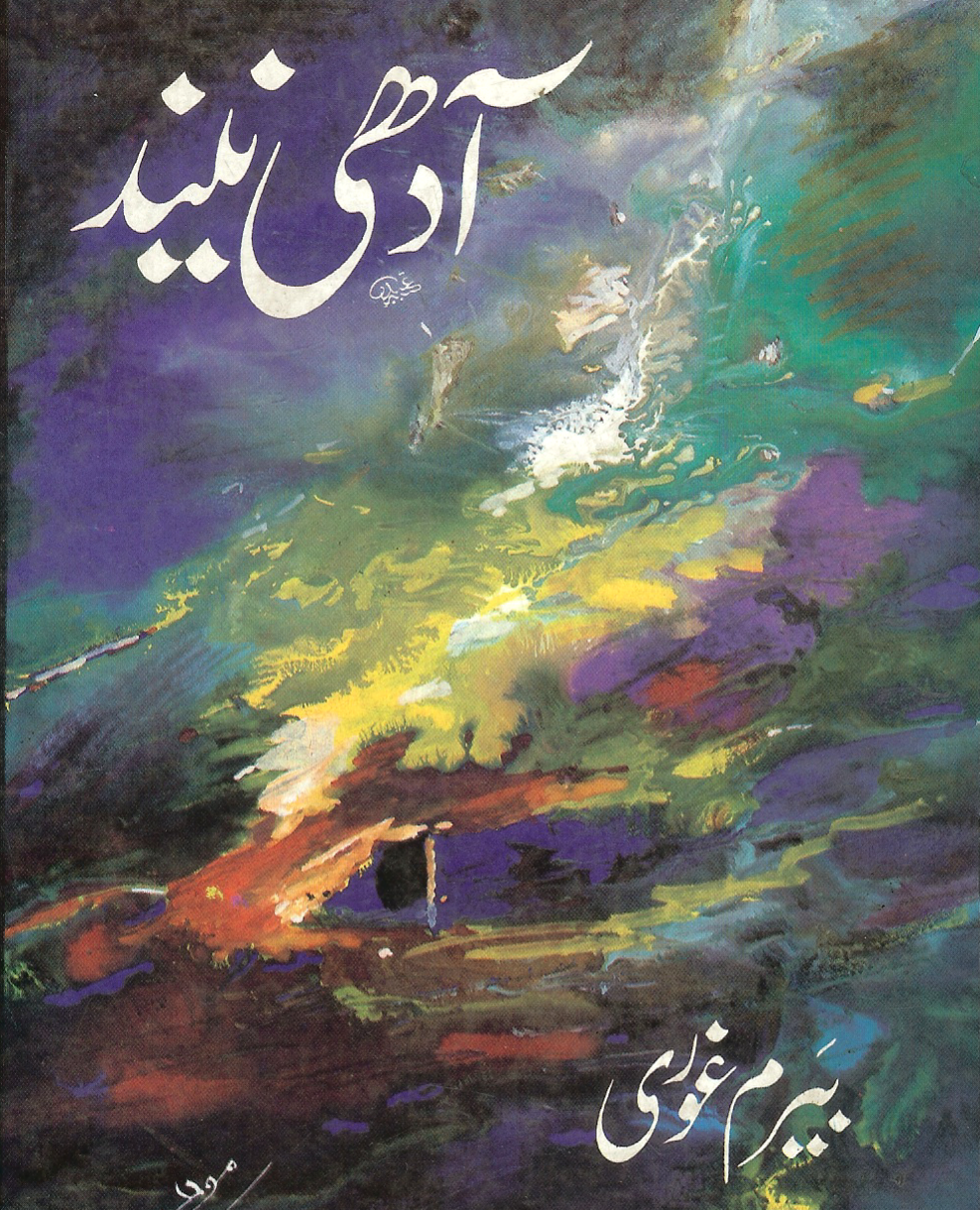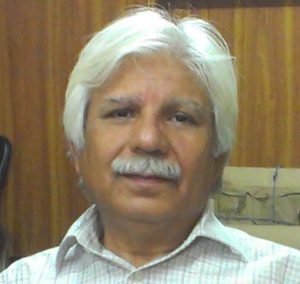
(Naeem Baig)
On a chilling winter night, far away down the hills, the freezing water stream runs silently below its surface along the pines, cedars and cypresses; and if someone there lit a fire on the way to stay alive; then one feels, how soothing its warm influence flowing from the inside by reading the ghazals and poems in Baram Ghouri‘s poetry book, “Aadhi Neend.” He crafts metaphors, he paints images, and he draws symbolic feelings deep inside the human spirit.
’’ بیرم غوری کی نظمیں ہوں یا غزلیں، سب کی سب اپنی ثقافتی زمین کی زائیدہ اور اسکے باغ و راغ کی فیض یافتہ ہیں۔ مفرد الفاظ سے قطع نظر کتنے ہی کنایات اور استعارات ایسے ہیں جو بیرم کی پوری کی پوری شاعری پر چادر تانے ہوئے ہیں مگر بات لفظیات تک محدود نہیں ‘‘
ڈاکٹر فرمان فتح پوری
His ghazals are two way swords, filled with light and at the same time assonant echoes carrying a torch for his vows and lost dreams throughout the verses. Yet they hold the strings of hopes in the twilight to stave off the darkness and to cleave off the hatred through his words. Baram knows how often human feelings starve in words to work, as he lived major part of his life in a caravan moving on in Baluchistan’s terrain. A man who would choose to live like a nomadic life would write vibrant poetry.
ہاتھ رُت کے سہی ہنر آثار
خواب اگتے نہیں سحر آثار
سوئی بستی کے سر پہ آ پہنچی
ایک سجری سحر گجر آثار
بن گئے سب ہتھیلیوں پہ چراغ
پھول، خوشبو ، ہوا، شجر آثار
دھوپ کے کھولتے سمندر میں
اک سفر پھر ہی ایک سفر آثار
تیری فرقت میں شہر ویرانہ
تیری قربت میں دشت گھر آثار
Much is at stake here— Baram Ghouri looks profoundly at the galaxies and as being a keen crafter narrates the joy and grief he feels into his words; enhance the rhythm of odes he chooses to portray. That’s what Baram does; he pours the love into the language. He tells us how to suppress the grief and uphold the internal echoes’ of his soul.
یہ کیسی ایک مجبوری ہے۔۔۔ہونے یا نہ ہونے میں
بدن بنیاد کیوں بنتا ہے۔۔۔ ہونے یا نہ ہونے میں
نجانے کون سے ابجد میں ہے میرا بدن کہ جو
کسی اسمِ مبارک سے، طلسم شوخیِ لب سے
کسی اعجاز ساعت سے، محبت سے
محبت کی ضرورت سے۔۔۔ نہیں کھلتا
نہ ماضی ہے نہ آئیندہ ( مگر یہ حال جو بھی ہے)
یہ مجھ سے پیشتر کا یا کسی آتے زمانے کا کوئی وقفہ سا ہے
تو پھر ہونے نہ ہونے کے پسِ آزار ذمہ دار سے کوئی اتنا پوچھے
تماشا کیوں بنایا تھا!
تماشا ، کسی وقفے کا تماشا
جو کہ بس ناظر یا کرداروں میں ہوتا ہے ۔۔۔۔
………………………………………
رہ گئے ہیں بے چہرہ دائروں کی مٹھی میں
ورنہ نقش کتنے تھے زاویوں کی مٹھی میں
بانجھ آسماں نیچے، ہو گئے کہاں آباد
رنگ سارے گم سم ہیں موسموں کی مٹھی میں
Renowned Urdu Critic Dr. Farooq Ahmad in
the preface to the ‘’Aadhi Neend” has categorically described his ghazals as part of the dawn emerging from the deep rooted labyrinth darkness with aesthetic qualities of his inner feelings though Baram has not used it in compressed form, yet stunning words speak from his pen with the readers.
جنہیں اک ساتھ جینا تھا، وہ سارے دن نہیں آئے
ہمادی زندگی میں کیوں، ہمارے دن نہیں آئے
جتنی مدت ہم نے تیرے ہجر میں کاٹی ہے
اتنی مدت میں دیواروں میں خم پڑ جاتا ہے
’’بات کچھ بھی ہو ہجر کا یہ چونکا دینے والا شدید احساس بیرم کے ہاں بڑی فرافانی سے ملتا ہے۔ بیرم کے پاس پر فریب خواب نہیں، اُن کی آنکھوں میں صدیوں کی ٹوٹی ہوئی نیند کوئی ایسا منظر تراش ہی نہ سکی جس پر انسانی خون کے دھبے نہ ہوں ‘‘
ڈاکٹر فاروق احمد
In addition to the forms of rhyme, alliteration and rhythm that structures much of his poetry is the style of Baram that plays a more delicate role in his even free verses poetry in creating pleasure. Baram refers to the musical, flowing quality of words arranged in an aesthetically pleasing way.
ایک خواب میسر نہیں رنگوں کا بی ہونا
بیکار ہے اس شہر میں آنکھوں کا بھی ہونا
کھڑکی سے ادھر جاگتی بستی سے نہ پوچھو
سنسان سی راہوں پہ مکانوں کا بھی ہونا
۔۔۔۔۔۔۔۔۔۔۔۔۔
خیال تازہ پہ ہے منحصر چراغ جلے
بیاضِ مصرع گل پہ اگر چراغ جلے
ہمیں حوالہِ نسبت ہے معتبر لیکن
ہمارے بعد کوئی معتبر چراغ جلے
Baram Ghouri, among his contemporaries’, walks in the corridors of Urdu literature a step ahead of his period, as Dr. Muhammad Ali Siddiqui describes his poetry likely to be followed a long way ahead of moments in hand.

A renowned Professor of Urdu and leading linguistic critic from Karachi University Prof. Sahar Ansari recognises Baram’s poetic romanticism that emphasised inspiration of the primacy of the individual.18th century romanticism was a reaction against the order and restraint of classicism and neoclassicism, and a rejection of the rationalism which characterized the enlightenment that is perhaps conceded in Baram’s mind while he opts the difficult way.
’’دراصل بیرم غوری نے پیش پا افتادہ راہوں سے گریز کر کے اپنے لیے ایک نیا جادہِ سخن تراشا ہے۔ انکی شاعری میں رومانیت ، ذات کے دکھ، وطن کی مٹی سے محبت، انسان دوستی اور آفاقیت کی تلاش ’سرگم‘ کے سروں کی طرح مل کر ایک ’ سمفنی‘ میں ڈھل گئے ہیں ۔۔۔۔۔۔‘‘
پروفیسر سحر انصاری
I personally look forward to the incredible work Baram is doing and would be doing in the days ahead. He still got the muscle to explore his poetry as said by Shelley “the poet’s search for himself” provided he gets through his most complex research work he is engaged since last many years.


